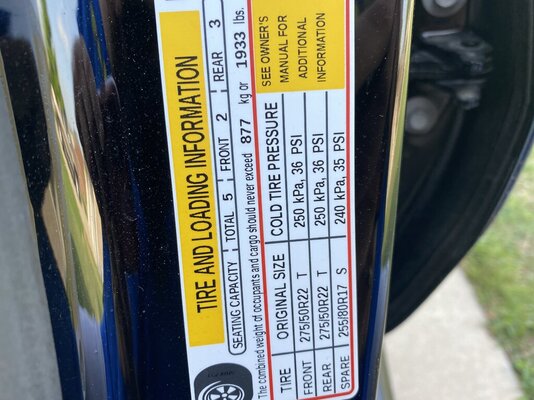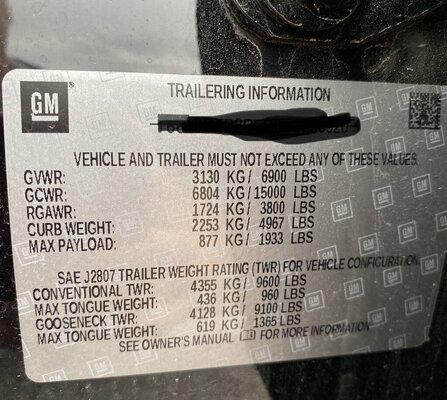Good afternoon, first post. I searched through the threads but am confused.
I'm looking at purchasing my first travel trailer. Safety and not damaging my truck are absolutely more important than comfort/length/amenities.
Vehicle specs: 2020 GMC Sierra Crew Cab, short bed, Elevation trim, 5.3L V8, 3.23 gears. The GVWR of the truck is 6900 lbs, GCWR 15,000, Max payload 1,933 lbs, conventional TWR 9,600 lbs, max tongue weight 960. I have a Curt Class 3 hitch rated at 6,000 normal and 10,000 weight distribution. I don't have a brake controller but was planning on adding one along with heavy duty shocks if needed. The truck does have a trailer selection dial (can switch between normal, ice/snow, and sport). I do not plan on adding any cargo to the truck since we will always be traveling with 2 cars due to family size so I will come nowhere close to loading down pickup. The most I anticipate is around 300 lbs.
Trailers I've considered:
Coleman Lantern 263BH. 30 feet, 7 inches in length with a dry weight of 6,084. Cargo weight is listed at 1,516 so I assume the GVWR is 7,600? Hitch weight is 811 lbs. Has 1 slide.
Forest River Cherokee 26DBHBL. 31 feet, 7 inches. Dry weight 5,795 cargo weight is 1,930 and gross weight is 7,725. Hitch weight 725 lbs and 1 slide.
Prime Time Tracer 260 BHSLE. 29 feet 11 inches, dry weight 5,156. Cargo weight 2,519. Hitch weight 675 lbs. 1 slide.
Is this possible given the vehicle I have? Is over 30 feet dangerous to pull with a 1/2 ton? Any suggestions for a safe travel trailer experience? Thanks in advance!!
I'm looking at purchasing my first travel trailer. Safety and not damaging my truck are absolutely more important than comfort/length/amenities.
Vehicle specs: 2020 GMC Sierra Crew Cab, short bed, Elevation trim, 5.3L V8, 3.23 gears. The GVWR of the truck is 6900 lbs, GCWR 15,000, Max payload 1,933 lbs, conventional TWR 9,600 lbs, max tongue weight 960. I have a Curt Class 3 hitch rated at 6,000 normal and 10,000 weight distribution. I don't have a brake controller but was planning on adding one along with heavy duty shocks if needed. The truck does have a trailer selection dial (can switch between normal, ice/snow, and sport). I do not plan on adding any cargo to the truck since we will always be traveling with 2 cars due to family size so I will come nowhere close to loading down pickup. The most I anticipate is around 300 lbs.
Trailers I've considered:
Coleman Lantern 263BH. 30 feet, 7 inches in length with a dry weight of 6,084. Cargo weight is listed at 1,516 so I assume the GVWR is 7,600? Hitch weight is 811 lbs. Has 1 slide.
Forest River Cherokee 26DBHBL. 31 feet, 7 inches. Dry weight 5,795 cargo weight is 1,930 and gross weight is 7,725. Hitch weight 725 lbs and 1 slide.
Prime Time Tracer 260 BHSLE. 29 feet 11 inches, dry weight 5,156. Cargo weight 2,519. Hitch weight 675 lbs. 1 slide.
Is this possible given the vehicle I have? Is over 30 feet dangerous to pull with a 1/2 ton? Any suggestions for a safe travel trailer experience? Thanks in advance!!


